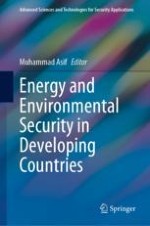2021 | OriginalPaper | Chapter
Energy Security: A Case Study of Indonesia
Authors : Qodri Febrilian Erahman, Widodo Wahyu Purwanto
Published in: Energy and Environmental Security in Developing Countries
Publisher: Springer International Publishing
Activate our intelligent search to find suitable subject content or patents.
Select sections of text to find matching patents with Artificial Intelligence. powered by
Select sections of text to find additional relevant content using AI-assisted search. powered by
